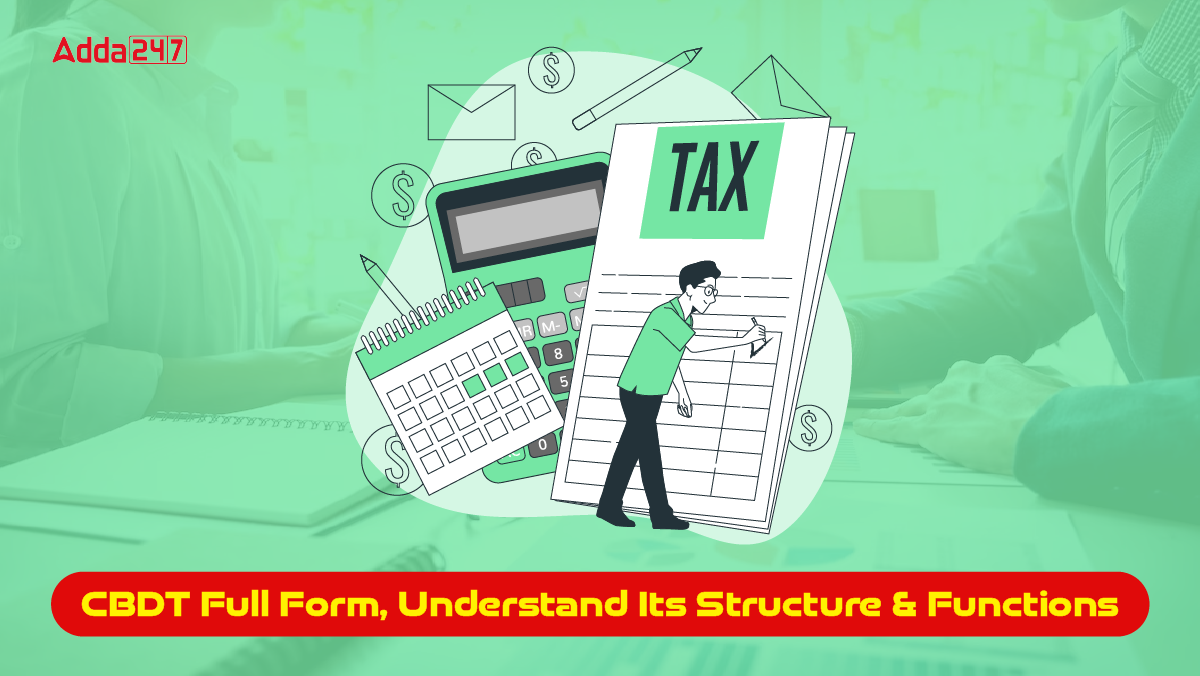CBDT Full Form
The term CBDT stands for the Central Board of Direct Taxes, a vital regulatory authority in India tasked with overseeing the enforcement of laws pertaining to direct taxes. Formed under the Central Board of Revenue Act, 1963, the CBDT operates as a crucial component within the Department of Income Tax, functioning under the Ministry of Finance. This article explores the organization’s framework, responsibilities and recent updates concerning the CBDT.
Structure of CBDT
The CBDT is comprised of a chairman and six members, each overseeing specific aspects of the Income Tax Department. These six members handles the following areas:
- Income Tax & Revenue: This member is responsible for the collection and management of revenue generated through direct taxes.
- Administration: Ensures the smooth functioning of the Income Tax Department and its various branches.
- Legislation: Focuses on formulating tax-related policies and suggests legislative changes to improve tax administration.
- Audit and Judicial: Manages tax audits, oversees legal matters and represents the department in judicial proceedings.
- Investigation: Handles investigations related to tax evasion, fraud and other financial irregularities.
- TPS & System: Looks after the development’s technical and digital infrastructure.
| Other Important Articles | |
| CGST Full Form | AHRC Full Form |
| ACD Full Form | POV Full Form |
Functions and Responsibilities of CBDT
The CBDT plays a pivotal role in India’s tax ecosystem. It carries out a wide range of functions that can be broadly categorized as follows:
- Formulating Tax Policies: The CBDT, in collaboration with the Indian government, devises and implements tax policies. These policies guide the application of direct tax laws and ensure the efficient collection of revenue.
- Tax Administration: It oversees the management and administration of the income tax department. This includes establishing the structure of the income tax division, developing operational procedures and implementing measures to prevent tax evasion and avoidance.
- Personnel Management: The CBDT is involved in personnel management, including recruitment, training and addressing employment-related issues concerning the employees of the Income Tax Department.
- Setting Tax Collection Goals: It sets goals and operational plans for tax collection, ensuring that the revenue targets are met. The CBDT is responsible for processing tax claims exceeding Rs.25 lakhs for each transaction.
- Legal Matters: The CBDT handles legal matters pertaining to tax laws and financial planning. This includes overseeing legislative advisory groups and addressing issues related to tax evasion techniques.
- Tax Investigation: One of the CBTD’s essential role is investigating tax avoiding, prevention and detection. It deals with cases of tax evasion and tax avoidance and it plays a vital role in the prevention of benami transactions.
- Audit and Judicial Matters: The CBDT is involved in matters related to tax audits and judicial proceedings. This includes court cases, legal disputes and selecting lawyers for various tax-related issues.
Impact on India’s Tax System
The CBDT’s functions have far-reaching consequences for India’s tax systems. It ensures the fair and effective collection of direct taxes, contributing significantly to the country’s revenue. By setting tax policies and implementing measures to prevent tax evasion, it helps maintain the integrity of the tax system.
In recent years, the CBDT has also been actively promoting taxpayer education and awareness. Initiatives such as free online income tax training have been introduced to enhance financial literacy among taxpayers. Furthermore, the implementation of the Goods and Services Tax (GST) in India is also supervised by the CBDT, making it a key player in India’s transition to a more simplified and unified tax system.
Find More General Studies News Here




 Which Lake is known as the Jewel of Udai...
Which Lake is known as the Jewel of Udai...
 Which is the Largest Banana Producing St...
Which is the Largest Banana Producing St...
 Which is the First Tiger Reserve of Utta...
Which is the First Tiger Reserve of Utta...








